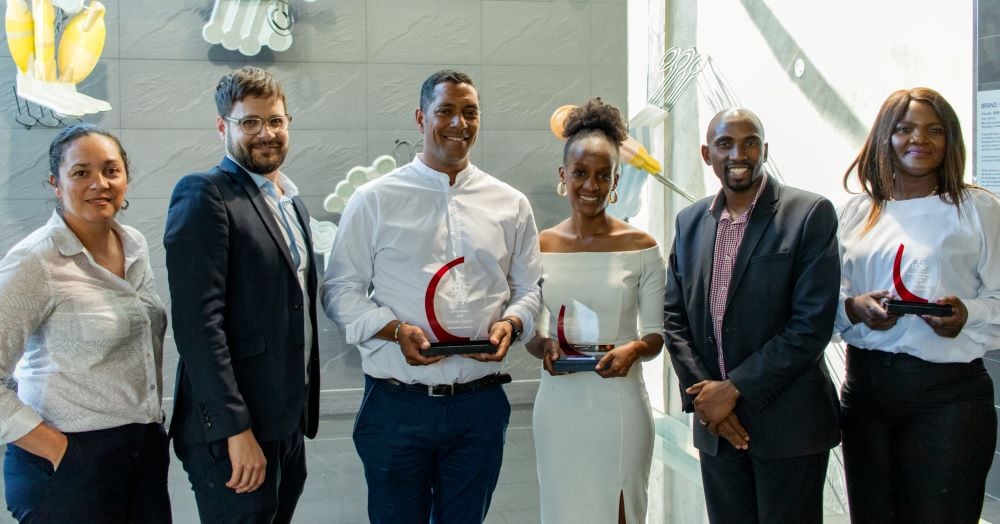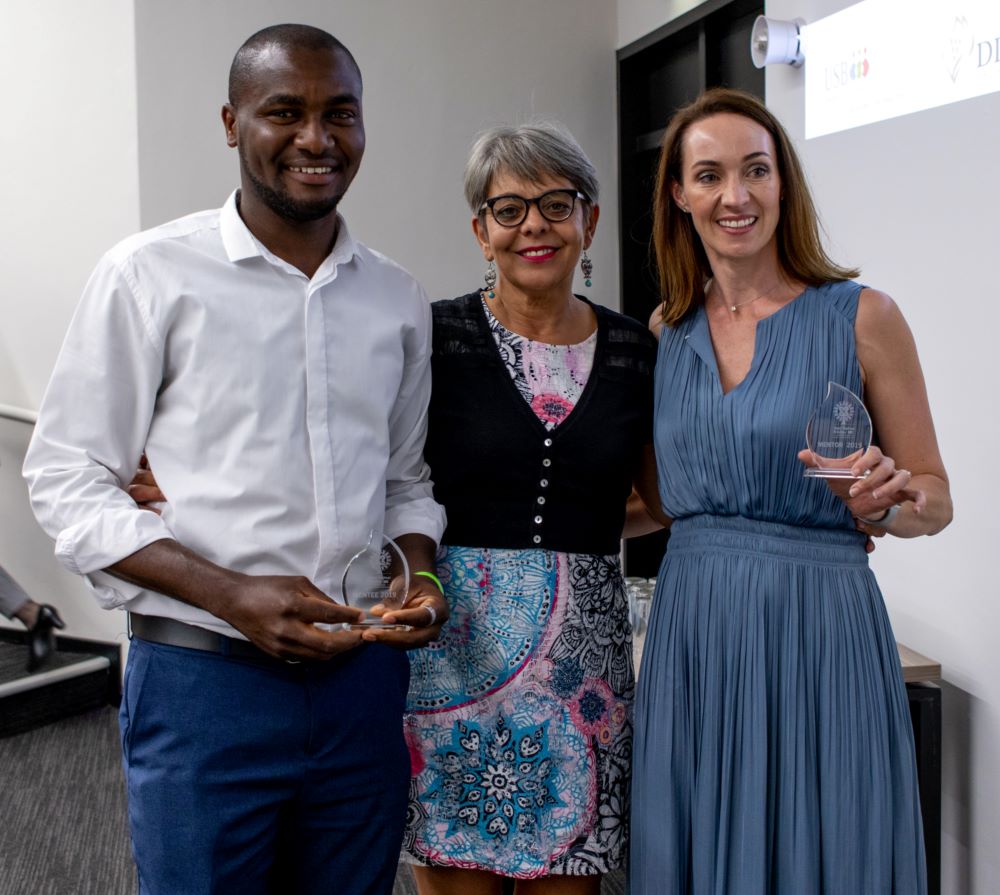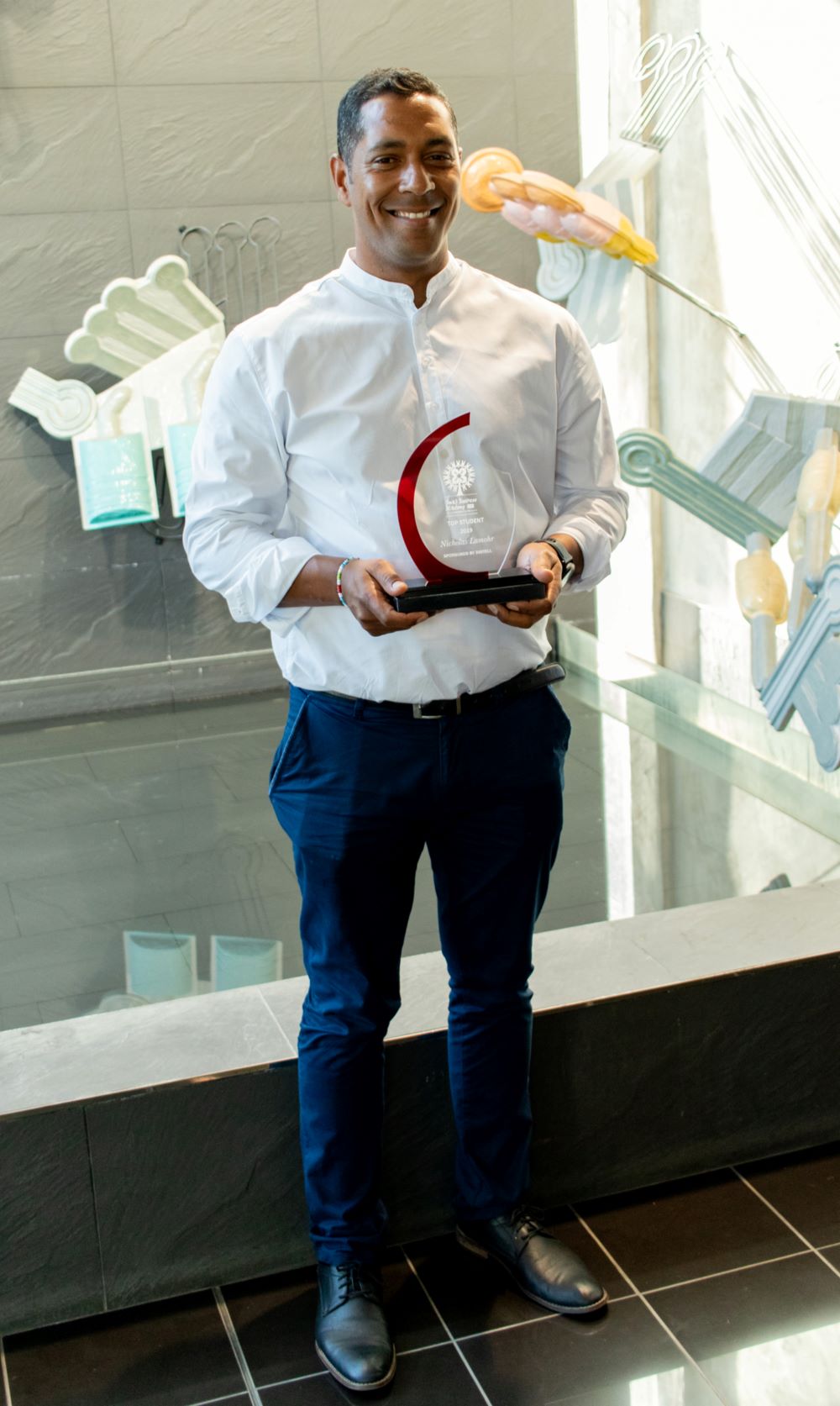Entrepreneurs from low-income areas excel
Nicholas Lamohr, grew his company to profitability through perseverance and a gap in the market despite lacking start-up capital and a business plan. Nicholas is the recipient of the Distell Top Student award at the 2019 Small Business Academy (SBA) award ceremony on 5 December 2019.
Linchpin-PM offers website and digital strategy services to small businesses, and Nicholas achieved the highest mark overall in the 2019 SBA programme run by the University of Stellenbosch Business School (USB) for 21 entrepreneurs from low-income areas of the Western Cape.
The De Beers Business with the Most Potential award went to Barbara Thandeki from Gugulethu, co-owner of hand-made wig makers Khubar Hair & Beauty, while Michelle Mzee, managing director of Parow cleaning and security company Cleanstation (CSI), won the Absa Best Business Plan award.
The 22 small business owners graduating from the sponsored eight-month programme, demonstrate the power of small enterprises to improve the economy and contribute to alleviating poverty.
Sponsored by Distell, Absa and De Beers, the SBA empowers small business owners in low-income areas with knowledge to grow their businesses, become more sustainable and increase their potential for creating employment.
Each participant is also matched with a USB MBA alumnus as a mentor, proving to be one of the most significant game-changers of the programme. In recognition of this, for the first time, the top mentor and mentee pair was awarded. This was awarded to participant Martin Okolo and his mentor USB MBA Alumnus, and business coach, Louis-Delien Pienaar. Martin’s company, Vogue Exchange (PTY) LTD specialises in forensic registration and compliance services.
SBA head, Dr Marietjie Theron-Wepener, says the education, private and public sectors need to collaborate in supporting small businesses in order to contribute to reducing unemployment in South Africa.
“We are all aware of the National Development Plan (NDP), targeting GDP growth of 5% and unemployment reduction to 6% by 2030, to be achieved through the creation of 11 million jobs. The majority of this job creation is expected to be realised by small and expanding businesses, yet there is very little knowledge-based support for such entrepreneurs.
“Research shows that not all small businesses survive their first years. Typical hindrances include the inability to create a business plan, poor market research and financial planning and management. Business and entrepreneurial education is fundamental in sustaining these small business owners. Education providers, corporate and government need to step-up their involvement to share their knowledge and skills.
“By launching the SBA in 2013 we aimed to bridge this knowledge gap and have since trained 236 small business owners, equipping them with relevant business education, knowledge and practical skills,” she said.
The success of the programme to date is encouraging. The SBA’s ongoing impact study indicates an increase of 98% in full-time employment, a 187% increase in part-time employment and a 67% increase in revenue for the small businesses that received training at the SBA.
This approach to growth leaves uMhlathuze with a youth unemployment rate higher than for South Africa as a whole, while human development indicators as diverse as provision of water to homes, internet access, criminality and violence, and corruption lag behind. A situation in which minerals and profits are sent abroad, while relatively few local people have good jobs and the majority see no prospect for their own or their children’s advancement, is a recipe for disaster – a point underlined again and again in studies of private sector development in developing countries².
Rio Tinto’s response is to call on government to solve the problem. The company makes no mention of its own role in contributing to longstanding challenges or its responsibilities for generating and implementing solutions. Yet Rio Tinto tells us in its communications that it is a good corporate citizen attentive to the Guiding Principles on Business and Human Rights; the Performance Standards of the International Finance Corporation; industry standards such as those of the International Council on Mining & Metals of which it is a member; and the United Nations Global Compact, of which it is a founding member.
Even though top student Nicholas Lamohr, who grew up in the Cape Flats, started his business with no capital, no plan, no mentor or business training, he believed in his idea and persevered.
“I started Linchpin-PM after seeing a gap in the market for assisting small businesses. While working at a printing and design company for twelve years, I saw numerous small businesses’ requests for website design being turned away. Since the owner of the company was not interested in pursuing this opportunity, I registered my company and studied web design. Although I have been trading for eight years, I have been operating full-time for the past three years.”
Nicholas employs four freelance designers and runs his business from Diep River and his home office in Zeekoevlei. His company evaluates its small business clients’ website content, updates their corporate identity and branding, and other marketing collateral, and also provides them with a digital strategy.
“One of our key strengths is investigating whether their product or service could be marketable through e-learning, or if their business would benefit from an e-commerce solution as opposed to a conventional website. We have the necessary design and software programmes to pivot their business digitally to reach more customers.”
He credits the SBA programme for opening up a world of knowledge he never had.
The most impactful for me was the SWOT analysis which helped me to identify and plan around my business’s strengths and weaknesses. This, together with the marketing module which assisted me in addressing my business’s biggest flaw
“The most impactful for me was the SWOT analysis which helped me to identify and plan around my business’s strengths and weaknesses. This, together with the marketing module which assisted me in addressing my business’s biggest flaw – not marketing robustly enough – and creating a business plan as the blueprint to my vision and purpose, has given my business structure and future growth projection.”
Barbara Thandeki, co-owner of Khubar Hair & Beauty and winner of the De Beers Business with the Most Potential award, sees the business of hand-weaving wigs from human hair as more than a means to make a living.
Barbara and her business partner Khunjulwa Makaluza run their business from home in Gugulethu and view it as an opportunity to share their experience and knowledge, to teach and empower other women to go into their own businesses too.
“Starting the business has been a personal journey for me. Many people think that buying wigs is all about vanity. It’s not. I needed a solution to my own hair-loss problem and we realised a gap in the market for affordable, fashionable human hair wigs.”
Almost two years later the business is profitable and the pair plan to take home-based KhuBar Hair & Beauty online and into retail spaces, invest in technology to ramp up production and eventually franchise the business.
Starting the business has been a personal journey for me. Many people think that buying wigs is all about vanity. It’s not. I needed a solution to my own hair-loss problem and we realised a gap in the market for affordable, fashionable human hair wigs.
One of the handmade wigs can take up to five hours to make, and the women can make no more than four per day between them, but an investment in the advanced technology of a specialised sewing machine could ramp production up to 60 per day.
Barbara said wigs made from human hair (sourced from India, Mongolia, Brazil and Peru) have the advantage of being washed and conditioned, as well as styled and refurbished, making it a true investment piece – unlike synthetic wigs.
Michelle Mzee of Parow received the Absa Best Business Plan award for family-owned Cleanstation (CSI) in Parow, founded by her father after his retrenchment from a security management job.
CSI offers outsourced janitorial, office cleaning and private security services for estates, office buildings and schools in Parow and Goodwood and as far afield as Retreat in Cape Town. With very few businesses in the area offering both cleaning and security, their business is well positioned, especially considering the experienced skillset of their employees.
My father started the business out of necessity but ended up employing some of the people that were retrenched along with him, positively impacting them through his business venture. Today one of our greatest strengths is prioritising the wellbeing of our employees.
Michelle says the SBA experience has been truly life changing.
“I have learned so much from this course! I have moved from viewing my business as a source of income to something that I can grow and make a big success of. One of the most helpful aspects of the course was my mentor, Louis-Delien Pienaar, a USB MBA graduate who went above and beyond to assist me. She’s an accountant, a business coach and runs her own business so she really was able to help my business in many different aspects while also assisting me with my personal growth.”
Michelle advises budding entrepreneurs to seek advice often and from a variety of sources. “Build your knowledge and be strong. It will help you survive when you fail to get up and try again and again, as many times as it takes to succeed. Never give up!”
Applications are now open for the 2020 SBA programme.
The programme is substantially sponsored, although a commitment fee is payable by participants. Applications close on 31 January 2020 and the programme starts 11 March 2020.
For more information, call Lynette Goosen on 021 918 4379.
Subscribe
Want to stay in touch with the Stellenbosch Business School community? Sign up and receive newsletters from our desk to your inbox.
SIGN UP



